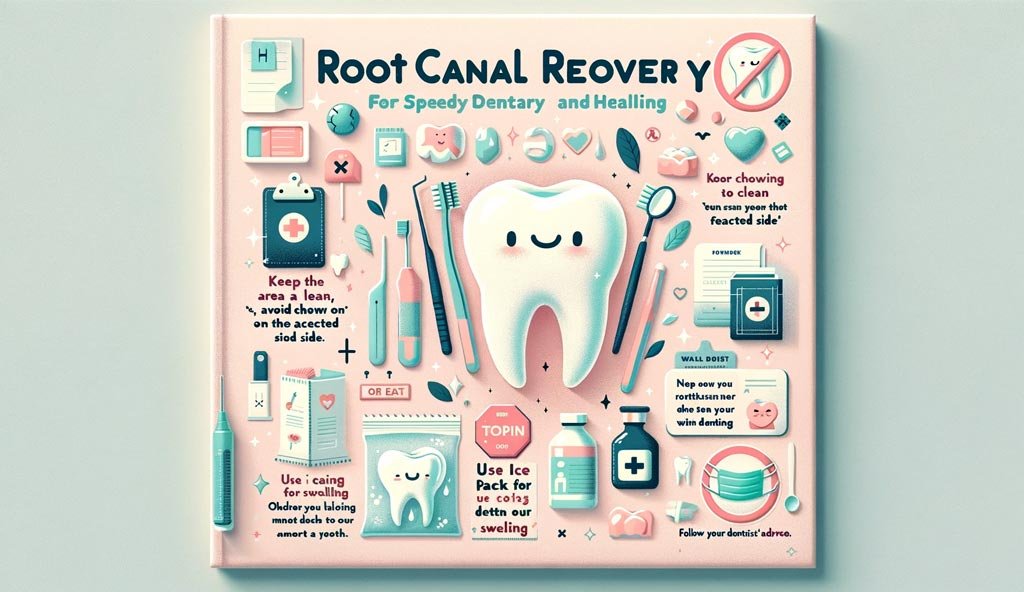With the right care and precautions, recovering from a root canal procedure can be smooth. Root canal treatments are common dental procedures performed to save teeth that would otherwise need to be extracted due to deep decay or infection in the pulp.
This article covers everything you need to know to feel better after your procedure. We’ll cover what to expect, how to manage any pain, and what to eat so your mouth heals up nicely.
Understanding Root Canal Recovery
Root canal recovery begins immediately after the procedure is completed. The initial recovery period typically lasts a few days and is crucial for the long-term success of the treatment. During this time, it’s normal to experience pain or discomfort around the treated area, which gradually subsides. Understanding what to expect during recovery can help manage anxiety and ensure you follow the correct aftercare procedures.
Pain Management Strategies
Pain management is a significant aspect of recovering from a root canal. Over-the-counter pain relievers like ibuprofen or acetaminophen are often recommended to help manage the discomfort. These should be used according to the dosage instructions or as your dentist prescribes. For more severe pain, your dentist may prescribe stronger pain medication.
However, It’s important to monitor how you feel and adjust your pain management strategies under the guidance of your dentist or endodontist.
Dietary Recommendations
Following a root canal, it’s advisable to stick to soft foods to avoid putting pressure on the treated tooth. Foods like yogurt, mashed potatoes, and smoothies are excellent choices. During the first few days after the procedure, avoid hard, crunchy, or sticky foods that could disrupt the temporary filling or irritate the sensitive area. Also, steer clear of very hot or cold foods and beverages, as the treated tooth may be temporarily more sensitive to temperature.
Oral Hygiene Practices
Maintaining good oral hygiene is crucial for preventing infection and promoting healing after a root canal. You should continue brushing and flossing your teeth, but be gentle around the treated area to avoid causing any irritation. Use a soft-bristled brush and non-abrasive toothpaste. If your mouth feels sore, rinsing gently with warm salt water can help soothe the area and keep it clean.
Protecting the Treated Area
To protect the treated tooth during the recovery period, avoid chewing on that side of your mouth. This precaution helps prevent the temporary filling from becoming dislodged, which is important for maintaining the integrity of the root canal treatment until a permanent filling or dental crown can be placed.
Monitoring for Complications
While complications from root canal treatments are rare when performed by a skilled dentist or endodontist, it’s important to be vigilant for signs of infection or other issues. If you experience severe pain that doesn’t subside with pain medication, visible swelling, or an allergic reaction to medication, contact your dental professional immediately.
Follow-Up Care
Attending follow-up appointments with your dentist is essential after a root canal procedure. These visits allow your dentist to monitor the healing process and ensure that the tooth and surrounding gum tissue recover properly. They also allow one to complete further necessary dental work, such as placing a permanent filling or crown.
Lifestyle Considerations
During your recovery, minimizing physical activity can help reduce bleeding and swelling. Staying hydrated and avoiding smoking or alcohol consumption can also promote healing. Rest as needed, and allow your body time to heal.
Psychological Impact and Support
It’s common to feel anxious or stressed about dental procedures, including root canals. Talking to your dentist about your fears or seeking support from friends and family can help alleviate anxiety. Understanding the procedure and recovery expectations can also provide reassurance.
Conclusion
By following these root canal recovery tips, you can help ensure a quick and effective healing process. Remember to maintain good oral hygiene, manage pain effectively, and follow your dentist’s advice closely. With the right care, you can recover from a root canal smoothly and continue to enjoy good dental health.
Remember, these guidelines are designed to aid your recovery, but always consult your dentist or endodontist for advice tailored to your situation. Their expertise is invaluable in ensuring the best outcomes from your root canal treatment.
While recovering from a root canal, it’s also essential to stay informed about other potential dental issues that might arise, such as misalignment problems. For those dealing with a crossbite, understanding how to fix a crossbite is crucial for long-term oral health. Treatment options can range from braces to more advanced procedures like jaw surgery, depending on the severity of the condition. Addressing alignment issues early can prevent further complications and improve overall dental function.

 Health2 years ago
Health2 years ago
 News6 months ago
News6 months ago
 Technology2 years ago
Technology2 years ago
 Celebrity2 years ago
Celebrity2 years ago

















